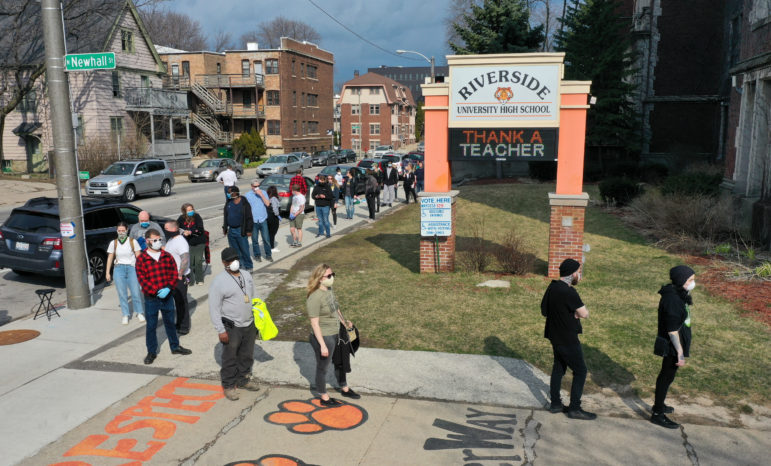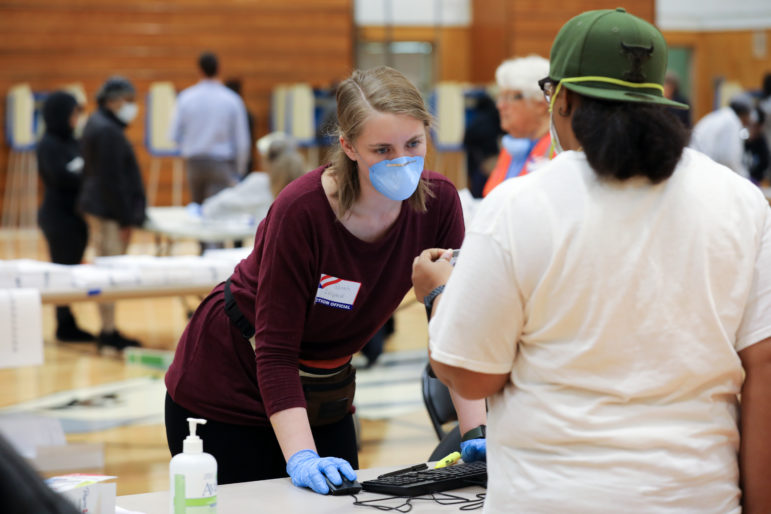Why Don Natzke Couldn’t Vote
Visually impaired Shorewood resident stymied by state legal barriers as Wisconsin held April election.

Don Natzke, 69, is seen in the backyard of his Shorewood, Wis., home on July 31, 2020. Natzke, who is visually impaired, was unable to vote in Wisconsin’s April election as fear of the COVID-19 pandemic kept him from his in-person polling place and he faced several hurdles casting an absentee ballot. Photo by Will Cioci / Wisconsin Watch.
Don Natzke, 69, has lived nearly his entire life with visual impairment. Natzke previously served as the executive director of the Milwaukee County Office for Persons with Disabilities, where he promoted accessible governmental policies to include people with disabilities.
But when it came to Wisconsin’s April 7 election — the only in-person balloting held in the midst of the pandemic that month — the Shorewood, Wisconsin, resident hit a surprising roadblock, due in part to his visual impairment.
Natzke was disenfranchised because recent surgery limiting his mobility and a fear of exposure to COVID-19 kept him away from his neighborhood polling site. Because of his age and underlying health conditions, for Natzke, complying with Wisconsin’s Safer at Home order meant not voting in person.
During a normal election, Natzke would use a headset and a computer to vote at the polling place less than two blocks from his home in suburban Milwaukee. And although state law allows blind voters to receive a ballot in Braille, Natzke said he did not realize that was an option.
“When I understood that the access to the voting site was going to be made more difficult for me due to the virus and to my health concerns, I requested an absentee ballot that would require me to submit a photo ID and a written request to my municipal clerk,” Natzke said.
Undaunted, Natzke utilized a service that allows a visually impaired person to use a cell phone to receive guidance from a trained agent in a remote location. Natzke would take a picture of the ballot and the agent would guide him in filling it in.
“Trying to make that process work to get accuracy in terms of marking a ballot and to be able to complete all of the parts of it ended up becoming absolutely impractical,” he recalled. “There was not a good way to directly mark a ballot using that process to be able to accomplish it.”
Natzke felt he had run out of options.
“Ultimately, I determined that there was not a way I could have people enter my environment, complete the ballot, get it submitted and get that process accomplished,” he said. “So, though I’m an active voter and I regularly vote, there wasn’t what I felt to be a safe, accessible and reasonable way to approach submitting the ballot.”
Natzke was not the only voter disenfranchised by Wisconsin’s pandemic presidential primary, which saw last-minute court-ordered changes in key election rules that left some voters bewildered — and some casting ballots that did not count.
Some voters were afraid to go to the polls, and many voted absentee, according to a report by Wisconsin Election Protection and the League of Women Voters of Wisconsin, which gathered information from 744 voters. But as an overwhelmed election and postal system struggled to manage more than 1.2 million requests for absentee ballots, many ballots never made it to voters’ homes or never left the local clerk’s office.
“We heard from people who have certain disabilities or medical conditions where it just was not safe for them to go on Election Day to the polls, and so they did everything right, to try and vote, but they just weren’t able to because the system failed them,” said Eileen Newcomer, the league’s voter education coordinator.

The voting line wraps around the block outside Riverside High School in Milwaukee during the presidential primary on April 7, 2020. Voters, including some with disabilities, say they were unable to cast a ballot in that election because of fear of the coronavirus. Photo by Coburn Dukehart / Wisconsin Watch.
Other voters lacked the technology or knowledge on how to request a ballot, make or send a copy of a photo ID or safely arrange a witness for their absentee ballot, the report found. And 23,000 absentee ballots that were filed were rejected — many due to errors made by first-time absentee voters, Wisconsin Watch and APM Reports found.
This time around, Wisconsin faces four ongoing federal lawsuits challenging state election laws, including three that allege the right to vote for people with disabilities was abridged on April 7.
Jeff Mandell is a Madison attorney in a lawsuit brought by Disability Rights Wisconsin and other plaintiffs. His clients seek to ensure that all voters with disabilities are provided assistive technology if they vote early in-person and a means for them to use assistive technology to vote from home before the November election.
“We are asking the court to provide some relief for those people, so they can have help to vote without taking COVID risks,” Mandell said.
Newcomer said voting is the way elected leaders share power with constituents, “and when people aren’t able to vote when they’re disenfranchised, that means that they are not allowed into the power-sharing process” that runs our country.

A poll worker wearing protective gear assists a voter at Marshall High School in Milwaukee on April 7, 2020. Wisconsin faces multiple lawsuits from plaintiffs with disabilities seeking additional accommodation to make voting more accessible in the November election. Photo by Coburn Dukehart / Wisconsin Watch.
Natzke said he hopes for more “enlightened” leadership in Wisconsin to help people with disabilities vote in November. Right now, he sees his choices as trusting that his local polling site is safe during a raging pandemic or compromising his privacy and health by having someone enter his house to help him fill out and witness his ballot.
The April 7 election, he said, was a big disappointment.
”To not have my vote counted,” Natzke said, “it concerned me gravely.”
Wisconsin Watch Managing Editor Dee J. Hall contributed to this story, which was reported in collaboration with The Guardian’s The Fight to Vote series. The nonprofit Wisconsin Watch (wisconsinwatch.org) collaborates with WPR, PBS Wisconsin, other news media and the University of Wisconsin-Madison School of Journalism and Mass Communication. All works created, published, posted or disseminated by Wisconsin Watch do not necessarily reflect the views or opinions of UW-Madison or any of its affiliates.
More about the 2020 Spring Primary
- Why Don Natzke Couldn’t Vote - Enjoyiana Nururdin - Aug 9th, 2020
- Centers for Disease Control and Prevention’s Morbidity and Mortality Weekly Report highlights public health measures taken by the Milwaukee Health and Fire Departments, Department of Administration, Election Commission, and the Wisconsin Department of Health Services - City of Milwaukee Health Department - Aug 4th, 2020
- CDC Says Election Did Not Cause COVID-19 Spike - Erik Gunn - Aug 4th, 2020
- Pandemic Reduced Black Vote, Study Finds - Dee J. Hall - Jun 25th, 2020
- Did April Election Hike COVID-19 Cases? - Alana Watson - May 20th, 2020
- Elections Commission Notes ‘Lessons Learned’ - Henry Redman - May 19th, 2020
- Wisconsin Elections News: WEC Releases Analysis of Absentee Voting in April 7 Spring Election - Wisconsin Elections Commission - May 18th, 2020
- Election’s Impact on County’s COVID-19 Cases Unclear - Jeramey Jannene - May 6th, 2020
- Why State’s Voting By Mail Was Chaotic - Daniel C. Vock - May 4th, 2020
- At Least 40 COVID-19 Cases Tied to Election in Milwaukee - Graham Kilmer - Apr 24th, 2020
Read more about 2020 Spring Primary here
More about the Coronavirus Pandemic
- Governors Tony Evers, JB Pritzker, Tim Walz, and Gretchen Whitmer Issue a Joint Statement Concerning Reports that Donald Trump Gave Russian Dictator Putin American COVID-19 Supplies - Gov. Tony Evers - Oct 11th, 2024
- MHD Release: Milwaukee Health Department Launches COVID-19 Wastewater Testing Dashboard - City of Milwaukee Health Department - Jan 23rd, 2024
- Milwaukee County Announces New Policies Related to COVID-19 Pandemic - David Crowley - May 9th, 2023
- DHS Details End of Emergency COVID-19 Response - Wisconsin Department of Health Services - Apr 26th, 2023
- Milwaukee Health Department Announces Upcoming Changes to COVID-19 Services - City of Milwaukee Health Department - Mar 17th, 2023
- Fitzgerald Applauds Passage of COVID-19 Origin Act - U.S. Rep. Scott Fitzgerald - Mar 10th, 2023
- DHS Expands Free COVID-19 Testing Program - Wisconsin Department of Health Services - Feb 10th, 2023
- MKE County: COVID-19 Hospitalizations Rising - Graham Kilmer - Jan 16th, 2023
- Not Enough Getting Bivalent Booster Shots, State Health Officials Warn - Gaby Vinick - Dec 26th, 2022
- Nearly All Wisconsinites Age 6 Months and Older Now Eligible for Updated COVID-19 Vaccine - Wisconsin Department of Health Services - Dec 15th, 2022
Read more about Coronavirus Pandemic here
-
Legislators Agree on Postpartum Medicaid Expansion
 Jan 22nd, 2025 by Hallie Claflin
Jan 22nd, 2025 by Hallie Claflin
-
Inferior Care Feared As Counties Privatize Nursing Homes
 Dec 15th, 2024 by Addie Costello
Dec 15th, 2024 by Addie Costello
-
Wisconsin Lacks Clear System for Tracking Police Caught Lying
 May 9th, 2024 by Jacob Resneck
May 9th, 2024 by Jacob Resneck


















